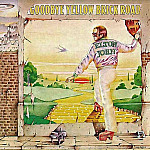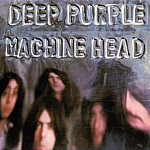Music History Events: Releases
March 1, 1974 Rush release their eponymous debut album. With drummer and creative catalyst Neil Peart yet to join the band, the sound is very different from the one that will become Rush's trademark. Still, the album's "Working Man" becomes a breakout song in blue-collar Cleveland, Ohio, after winning WMMS disc jockey Donna Halper's endorsement. One year later the band release Fly by Night, their first album to include Peart.
February 15, 1974 Deep Purple release Burn, their first album with the Mark III lineup of the band, featuring David Coverdale as lead singer.
 October 5, 1973 Elton John releases Goodbye Yellow Brick Road, his most successful studio album.More
October 5, 1973 Elton John releases Goodbye Yellow Brick Road, his most successful studio album.More
July 28, 1973 Deep Purple release "Smoke On The Water" as a single in America. The song, considered an add-on to fill space on the album, first appeared in March 1972 on Machine Head. By this time, lead singer Ian Gillan has quit the band.
June 4, 1973 Jimmy Buffett releases A White Sport Coat and a Pink Crustacean, his first Key West-themed album with producer Don Gant. It features the country-music parody "Why Don't We Get Drunk."
May 30, 1973 George Harrison releases his second post-Beatles album, Living In The Material World. It goes to #1 in America, where the single "Give Me Love (Give Me Peace On Earth)" also hits the top spot. Publishing royalties from that song and others on the album go to Harrison's Material World Charitable Foundation.
May 28, 1973 Conway Twitty and Loretta Lynn release "Louisiana Woman, Mississippi Man," which becomes their third #1 country hit as a duo.
April 30, 1973 The second Wings album, Red Rose Speedway, is released in America. There is some braille on the back cover spelling out the message, "We love you baby," aimed at Stevie Wonder.
April 27, 1973 The Cream compilation Heavy Cream is released in the US.
March 1, 1973 Tom Waits releases his debut album, Closing Time, on Asylum Records to lukewarm sales but warm critical reception.
November 7, 1972 Bette Midler's debut album, The Divine Miss M, is released. It earns a Grammy nomination for Album of the Year and helps Midler win the trophy for Best New Artist.
October 9, 1972 The Cream compilation Heavy Cream is released in the UK.
July 1, 1972 The Doobie Brothers release their second album, Toulouse Street. It contains their first hit, "Listen To The Music," and also their cover of "Jesus Is Just Alright," which gives some the impression they're a religious band.
May 19, 1972 Elton John releases Honky Chateau, which includes "Rocket Man." It becomes his first #1 album in America, igniting a run of six consecutive chart toppers.
 March 25, 1972 Deep Purple's album Machine Head is released in America. Most of it was recorded in their hotel after the Montreux Casino, where they planned to record it, burned down, a story told in the song "Smoke On The Water."More
March 25, 1972 Deep Purple's album Machine Head is released in America. Most of it was recorded in their hotel after the Montreux Casino, where they planned to record it, burned down, a story told in the song "Smoke On The Water."More
December 20, 1971 The live album from the Concert For Bangladesh, held six months earlier in Madison Square Garden, is released in America. The 3-disc set, which includes Bob Dylan's only performance from the 1970-1973 time period, wins the Grammy for Album of the Year.
November 26, 1971 Yes release Fragile, their fourth album and first with keyboard player Rick Wakeman. It includes some of their most enduring songs, including "Long Distance Runaround" and "Roundabout."
November 5, 1971 Elton John releases his fourth album, Madman Across The Water. It doesn't contain any big hits, but "Tiny Dancer" and "Levon" endure as classics.
November 1, 1971 Olivia Newton-John releases her first solo album, If Not For You.
October 1, 1971 Cat Stevens releases his fifth album, Teaser And The Firecat, with the hits "Peace Train" and "Morning Has Broken."
July 28, 1971 George Harrison releases his song "Bangla Desh," which brings attention to the refugee crisis in that country. He performs it three days later at his Concert For Bangladesh, the first major rock fundraiser.
May 28, 1971 Graham Nash of Crosby, Stills, Nash & Young (and before that, The Hollies), releases his first solo album, Songs For Beginners. The first single is "Chicago (We Can Change The World)," which he wrote about protesters at the 1968 Democratic National Convention in Chicago.
April 30, 1971 The Doobie Brothers release their self-titled debut album. Despite a hardy promotional push from their label, Warner Bros., it goes nowhere, but their next effort, Toulouse Street, connects.
March 26, 1971 Emerson, Lake & Palmer play their adaptation of Mussorgsky's classical piece "Pictures At An Exhibition" at Newcastle City Hall in England. The performance is released as a live album later that year.
August 11, 1970 Jimmy Buffett releases his debut album, Down To Earth, a folk-rock collection that includes "The Captain and the Kid" - a song written in honor of his late grandfather. The album sells just 374 copies.
June 14, 1970 The Grateful Dead release their fourth album, Workingman's Dead. With more compact songs like "Uncle John's Band" and "Casey Jones," it reaches a wider audience than their previous albums.
June 13, 1970 Uriah Heep release their debut album, ...Very 'Eavy ...Very 'Umble, in the UK. Critic Melissa Mills of Rolling Stone says she'll commit suicide if the group "makes it," but the negative critical reaction doesn't stop Heep from appealing to fans and moving on to have a long, successful career as a trailblazing heavy metal band.
June 4, 1970 Just one month after the Kent State Shootings, Crosby, Stills, Nash & Young release "Ohio," a song about the tragedy.
June 3, 1970 Stevie Wonder's "Signed, Sealed, Delivered I'm Yours," with a funky descending bass line courtesy of Motown Funk Brother Bob Babbitt, is released as a single.
April 6, 1970 Diana Ross, having left The Supremes four months earlier, issues her debut single as a solo artist, "Reach Out And Touch (Somebody's Hand)."
Back to Categories©2024 Songfacts®, LLC
